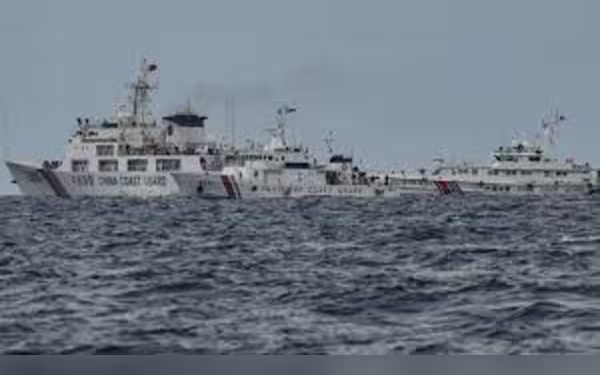Saturday, November 16, 2024 05:54 PM
China, Philippines Maritime Tensions Escalate in South China Sea
- China and Philippines accuse each other of ramming vessels.
- Incident near Sabina Shoal marks fifth confrontation in a month.
- Philippines vows to stand firm against Chinese coast guard actions.
 Image Credits: thefrontierpost
Image Credits: thefrontierpostChina and the Philippines exchange accusations of ramming vessels in the South China Sea, escalating maritime tensions in the disputed region.
The South China Sea has long been a hotbed of tension, with multiple nations laying claim to its rich resources and strategic waterways. Recently, the Philippines and China have found themselves in a heated exchange of accusations regarding maritime confrontations in this disputed region. On Saturday, both countries accused each other of intentionally ramming their coast guard vessels, marking yet another chapter in their ongoing rivalry.
The latest incident occurred near the Sabina Shoal, which has become a focal point for maritime disputes. This confrontation was the fifth in just one month, highlighting the escalating tensions in an area that is crucial for international trade, with approximately $3 trillion worth of goods passing through annually. The South China Sea is not only vital for trade but is also believed to be rich in oil, natural gas, and fish stocks, making it a highly contested region.
China claims almost the entire South China Sea, a stance that has been challenged by several nations, including the Philippines, Brunei, Malaysia, Taiwan, and Vietnam. In 2016, the Permanent Court of Arbitration ruled that China's extensive claims had no legal basis, a decision that Beijing has consistently rejected. This ongoing dispute has led to numerous confrontations, with both sides accusing each other of aggressive actions.
Philippine Coast Guard spokesperson Jay Tarriela presented videos during a press conference, asserting that a Chinese vessel, identified as Coast Guard vessel 5205, “directly and intentionally rammed the Philippine vessel” without any provocation. The incident resulted in damage to the Teresa Magbanua, one of the Philippines' largest coast guard cutters, although fortunately, no personnel were injured.
In response, Liu Dejun, a spokesperson for China's coast guard, claimed that a Philippine ship had “illegally stranded” at the shoal and had “deliberately rammed” a Chinese vessel. He urged the Philippines to withdraw its ship immediately or face consequences, emphasizing that the Chinese coast guard would take necessary measures to protect its territorial sovereignty and maritime rights.
Despite the escalating tensions, Tarriela stated that Manila would not withdraw its ship, asserting that they would stand firm against what he described as “harassment” and “bullying” from the Chinese coast guard. The Philippines had previously deployed a ship to the Sabina Shoal, located 75 nautical miles from Palawan, to assert its claims in the area.
Moreover, the Philippine maritime council reported that Chinese aircraft had made unsafe maneuvers against a civilian aircraft conducting patrols over other disputed areas, including the Scarborough Shoal and Subi Reef. The situation intensified further when the Philippines accused China of blocking a routine resupply mission, alleging that Chinese vessels had rammed and used water cannons against a fisheries bureau ship transporting essential supplies for Filipino fishermen.
This ongoing conflict in the South China Sea serves as a reminder of the complexities of international relations and the importance of diplomacy in resolving disputes. As both nations continue to assert their claims, the potential for further confrontations remains high. It is crucial for the international community to pay attention to these developments, as they not only affect the countries involved but also have broader implications for regional stability and global trade.













